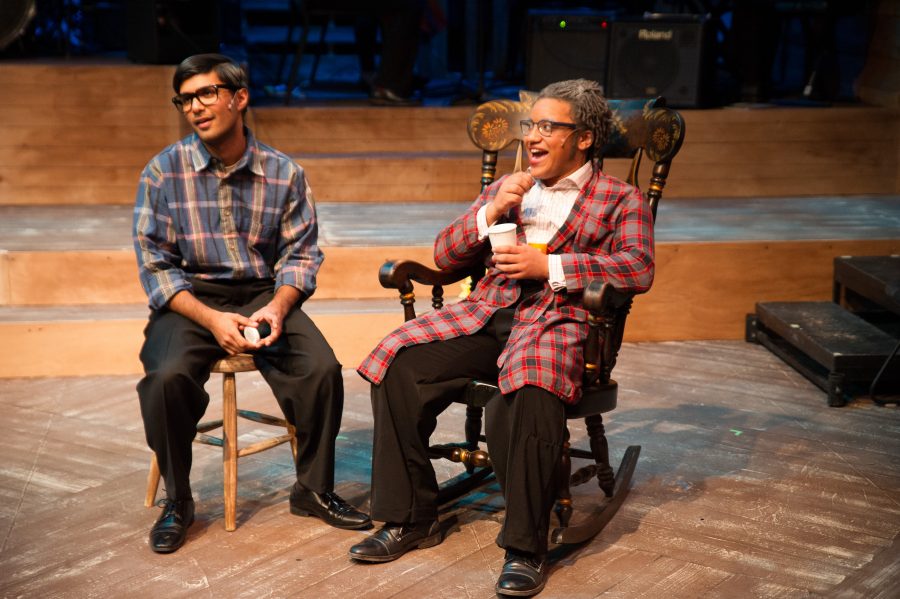The audience settled into their seats as the lights in the Little Theater dimmed. The room was tightly packed, and some audience members sat on the stairs. In a sea of black, the audience’s eyes were drawn to the red pops of color on band members’ costumes. The lights came up after a moment, and senior Achille Ricca bounded enthusiastically onto the stage.
Big Fish, directed by seniors Rene Miller and Kiley Smyth, ran December 5 through 8 at 7:30 pm in the Little Theater. It used intricate dances, lyric-heavy songs, and detailed costumes to tell a thought-provoking story.
The show was set in the small town of Ashton, Alabama. It centered around a father and son, Edward and Will Bloom, played respectively by Ricca and senior Amar Ahmad. Edward Bloom loves to tell stories to his son, although they are gross exaggerations. The show consisted of many flashbacks to when Will was a child. During that time, he listened to his father’s stories with deep interest and amazement. The majority of the show focused on adult Will trying to uncover the truth behind his father’s stories in order to find out who his father truly is.
The story was certainly not easy to portray in two hours. “Big Fish is a very ambitious show,” said Miller. “It’s very fantastical, and there are quick transitions.” She added that she and Smyth also had to consider the layout of the Little Theater. “It is a three-sided theater, so the audience is everywhere. That was difficult, but it was a learning process for Kiley and me,” she said. They executed it beautifully, and the actors made the audience members feel as if they were a part of the story.
The show opened with a scene between child Will, played by sophomore Talia Zalis, and Edward, his father. The excited facial expression Zalis had when looking up at Ricca conveyed the light-hearted nature of their relationship. Zalis’ eyes were bright, and they stared into their father’s eyes with a hopeful expression during their scenes. In “Fight the Dragon” Edward sang to his son about his adventurous life. In the stories of his past, Edward is always the hero. “The whole song is very touching. Will is kind of roped into the fantasy of everything,” Smyth said.
As Will grew older, he started to question the outlandish stories, demanding his father tell him the truth of his past. This caused their once-loving relationship to turn into one of misunderstanding and frustration.
Their relationship was especially tense in “Stranger” when Will sang with intense frustration, “My father is a stranger I know very well.” Unlike child Will, grown-up Will did not look at his father with hopeful eyes. He often avoided eye contact altogether. The tension in their relationship was relatable to the audience, and it even helped audience members connect with their own families. “Our story has really affected some of our actors and the people who have come to see it,” Miller said. “They talked about how it’s been affecting their family in a good way, and they have been understanding their parents more.”
Edward’s wife, Sandra Bloom, played by Imani Bibuld, tried to improve the father-son relationship throughout the musical. She explained to Will in her song, “Magic In The Man,” that while his father might not be perfect, Will was lucky to have him. With her powerful voice and clear pronunciation, Bibuld captivated the audience.
Big Fish centered around a tense relationship, but a number of humorous scenes cut the tension. Edward met Sandra when he saw her dancing with her two friends. The dancers gracefully executed their steps, and when Edward and Sandra started to fall in love, the song slowed down. The two other dancers looked sourly at the new couple, and they began to clumsily mess up the dance moves.
After this scene, the show took a tear-jerking turn. Will, who was still frustrated by his father, was called and told his father was in the hospital. He frantically raced to the hospital, but the doctor told him his father had no hope of living much longer. Audience members watched as Edward’s bubbly personality was reduced to sad expressions as he started to die in his hospital bed. Ricca did a great job of conveying the death by using fewer and more labored gestures and movements.
Will decided to put their bad relationship behind him for a moment and told his own story to his father. In the song “What’s Next,” Will told Edward the story of how he would die, surrounded by all the people he had helped in his life. He sang, “Only one dad inspiring one son. Edward, you’re done writing your perfect tale.” Will came to terms with the fact that his father had told stories, deciding that was just who his father was. He then wheeled his father’s hospital bed back to the hospital room. Several audience members started to cry as Edward died surrounded by his family.
According to Smyth, the ideas presented in Big Fish relate to the Newton community. “Big Fish dives deep into family issues, confronting our relationships with each other despite our differences. It uses fantasy to pull at the heart-strings of the audience,” she said. “For seniors right now, this is a time where we are going to move forward into a new chapter of life. We are going to be leaving our parents, so it’s a huge shift for a lot of people.”
Although many forces are pushing today’s society apart, Theatre Ink’s Big Fish shows us we should do the opposite: come back together.








































